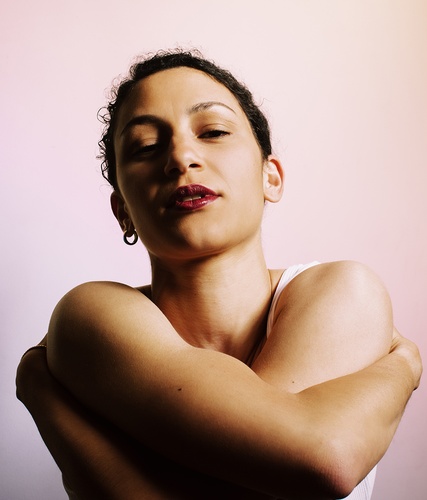Deena Abdelwahed en studio
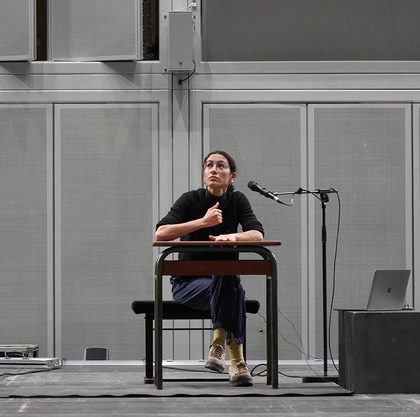
Un souvenir d'enfant - les enjeux artistiques
À l’origine de ce projet, il y a pour Deena Abdelwahed un souvenir d’enfance. L’un des premiers souvenirs qu’elle ait de faire elle-même de la musique – « faire » au sens de l’invention, de l’imagination, voire de la fabrique de la musique.
« Quand j’étais petite, raconte-t-elle, pendant les heures creuses à l’école, on chantait et dansait tous ensemble, histoire de mettre un peu d’ambiance. Et c’est moi qui donnais le rythme en tapant sur ma table d’écolier comme sur une darbouka. Quand je jouais sur cette table, ça sonnait bien sûr comme une table, mais, dans ma tête, j’entendais bien d’autres sons. » Voilà exactement l’instrument qu’elle développe dans les studios de l’Ircam : une table d’écolier, sur laquelle elle joue ses rythmes, mais susceptible de produire tous les sons qu’elle a dans la tête.
Un instrument qui vient de surcroît combler une lacune : sur le marché des instruments électroniques, en effet, tout ce qui concerne la percussion, la production de rythme ou le beat making, se présente sous une forme plus ou moins dérivée, ou inspirée, du set de batterie : des pads ou boutons espacés les uns des autres produisent chacun un signal MIDI qui déclenche un son, de manière plus ou moins univoque. Un dispositif, mais aussi un manque de nuance, frustrants pour la musicienne tunisienne.
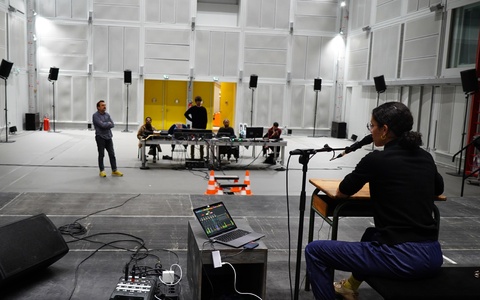
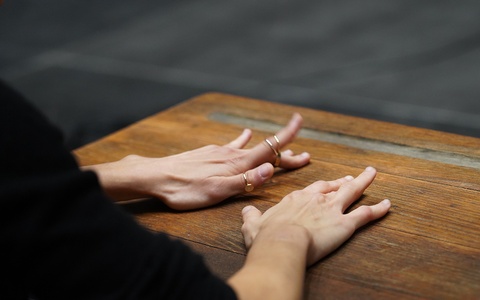
« Pour l’instant, personne n’a songé à produire un instrument électronique sur le modèle de la darbouka ou d’un autre instrument similaire. Peut-être sont-ils considérés comme trop cantonnés aux musiques traditionnelles ? C’est bien dommage car, avec ce type d’instruments, on tire une multitude de sons et de moteurs rythmique d’un seul et même espace. Je rêve d’un instrument de percussion électronique, qui consiste en un outil de captation MIDI reproduisant la variété de jeux (vélocité, attaques, etc.) et de sons (plus ou moins résonant ou frotté, etc.) d’un instrument comme la darbouka. »
L’enjeu est donc d’inventer une nouvelle lutherie adaptée à son langage musical propre.
Adapter la technologie - les enjeux technologiques
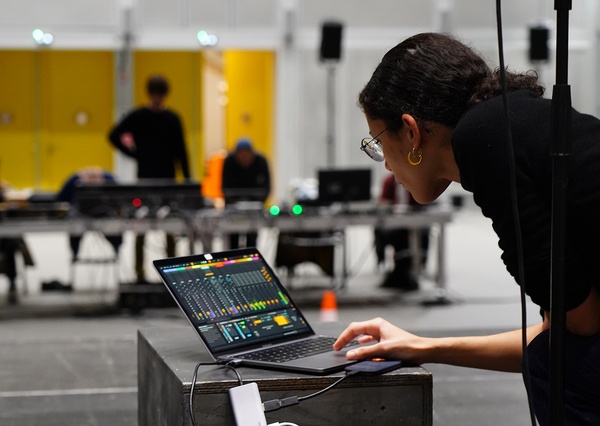 De son poste d’observation privilégié, Deena Abdelwahed se tient parfaitement à la page de l’actualité de l’Ircam : « J’aime beaucoup le site et ses blogs. Travaillant au quotidien avec des outils de la suite IrcaMax 2, je me tiens au courant de tous les plug-ins accessibles via Ableton Live. Suivant tout cela de près, j’ai depuis un moment un certain nombre de questions, de théories et d’idées d’application musicale de certaines recherches qui se font à l’institut, que j’aimerais expérimenter. Mais, de la captation MIDI à l’intelligence artificielle, en passant par l’apprentissage profond, ma question principale en arrivant était, et est encore : comment appliquer ces outils à ma pratique artistique, comment personnaliser ces techniques et technologies ? »
De son poste d’observation privilégié, Deena Abdelwahed se tient parfaitement à la page de l’actualité de l’Ircam : « J’aime beaucoup le site et ses blogs. Travaillant au quotidien avec des outils de la suite IrcaMax 2, je me tiens au courant de tous les plug-ins accessibles via Ableton Live. Suivant tout cela de près, j’ai depuis un moment un certain nombre de questions, de théories et d’idées d’application musicale de certaines recherches qui se font à l’institut, que j’aimerais expérimenter. Mais, de la captation MIDI à l’intelligence artificielle, en passant par l’apprentissage profond, ma question principale en arrivant était, et est encore : comment appliquer ces outils à ma pratique artistique, comment personnaliser ces techniques et technologies ? »
« Par exemple, depuis 2017, j’utilise Notetracker pour composer. Le principe est le suivant : je chante une mélodie au micro, et Notetracker transforme la suite de notes chantées en signal MIDI, qui pourra ainsi être réutilisé sur n’importe quel synthétiseur ou autre instrument hardware. Mon approche de la mélodie est en effet très intuitive, et c’est pour moi bien plus rapide et efficace de composer ainsi. Seul problème : Notetracker fonctionne avec une échelle de hauteurs à tempérament égal. Moi pas. Avec les chercheurs de l’Ircam, nous essayons donc de l’adapter à d’autres échelles harmoniques et de le rendre plus sensible (de l’ordre du comma, ou même pour du pitch bend, c’est-à-dire de la modification linéaire de hauteur). »
La démarche est à peu près la même pour doter la table d’écolier d’une sensibilité à une plus vaste palette de modes de jeu, associée à une grande richesse de sons.
« Avec Robin Meier, nous développons un capteur, qui consiste en un micro piezo-électrique collé sur le fond de la table d’écolier. Ce capteur est associé à un plug-in capable de discriminer les différents modes de jeu et d’envoyer ensuite le signal sous format MIDI à un Drum Kit de ma fabrication, qui synthétise enfin le son. »
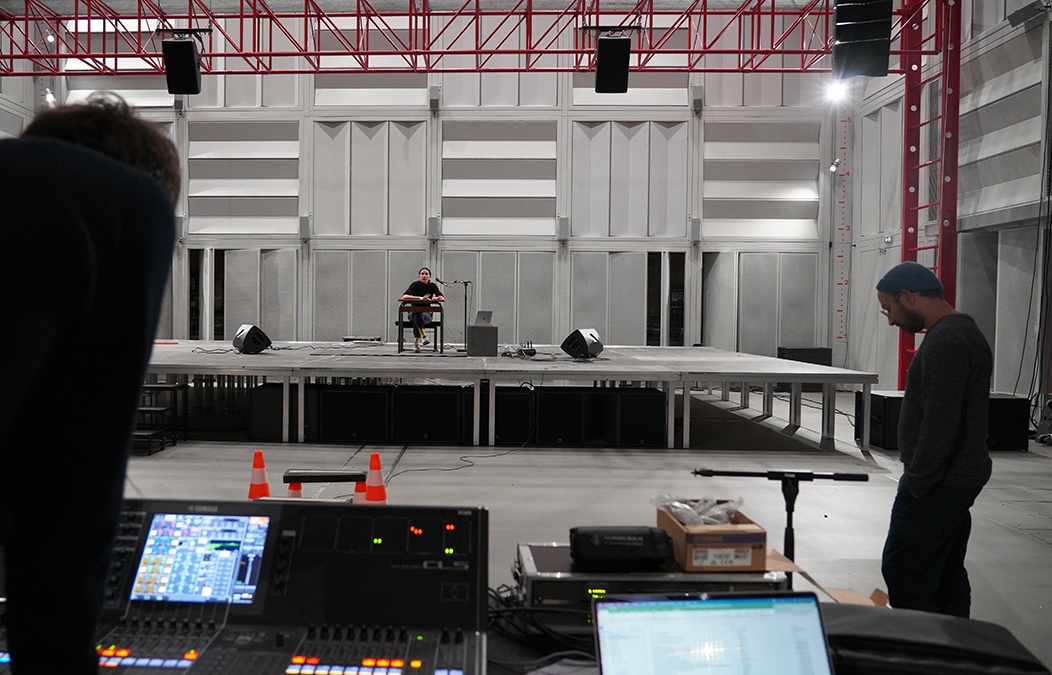
À l’artisanat de la lutherie s’ajoute donc tout un travail d’apprentissage machine pour faire apprendre au logiciel les nuances des modes de jeu associées aux sons produits. « Dans un second temps, conclut Deena Abdelwahed, j’aimerais utiliser ce même instrument, avec ces mêmes outils de discrimination de modes de jeu, mais pour produire d’autres timbres, éventuellement avec des instruments chimériques. »
Photos : Deena Abdelwahed, travail à l'Espace de projection de l'Ircam © Ircam - Centre Pompidou, photo : Deborah Lopatin



